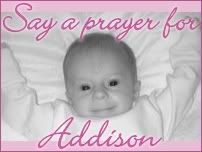Discipline difficulties
I was just over at
First and foremost if your child does something to make you extremely angry and you feel like your going to get violent, give yourself a time out. Tell your child you are very angry and you need some time to cool off before you discuss the situation. Go in another room and count to 100 if you have to and breath in through your nose and out through your mouth slowly. When you are calm go back and sit your child down and explain to them what they did to upset you and why it is not okay to do that. If necessary give a consequence for their actions to match what they did wrong. For example, if my children don't look both ways before riding their bikes in the road they are told to get off their bikes for five minutes, if they repeat the offense in the same day, they lose their bike privileges for the day. ( This works best with older kids, but the earlier you introduce it the better it works.) For instance, Bubba is only 10 months old, but he is starting to stand in his high chair a lot. This is very unsafe, so his consequence is he is removed from the high chair and told "Your telling me your done by standing up so you are being removed." The key with any discipline is consitancy.
I have found with dealing with other peoples children the best way to discipline is by laying down rules before they start to play. When the neighborhood kids come over we lay down the "law" and what the consequences are if the "law" is broken(usually the child is told he/she must go home). I have found that most of the time if the children know the rules of the house they are playing at before hand it really helps alleviate any problems. It also helps that the parents know your expectations too, so they can discipline their children accordingly at your house.
When it comes to bullying, I have taught my children to use their words first and tell the child they do not like what is being said or done. If the child doesn't listen, I have taught my children to ask for some assistance from a trusted adult. IF there is no trusted adult and they are being physically hurt and the child will not listen, they have our permission to defend themselves. For example, Picasso was being choked by a fifth grader on the bus last year so he defended himself and punched the kid in the face. Picasso was 5 and this kid was 11!
When it comes to young children, infants and toddlers, you need to be consitant also and talk to them! Most Infant/ Toddler aggression is out of frustration with not knowing how to express their feelings, it is our responsibility as parents to teach them proper and safe outlets for dealing with their emotions and frustrations. Biting is the biggest fear of all parents. But it is a natural way for an Infant/Toddler to communicate their feelings. If your child is a biter, shadow him/her for a couple days especially when interacting with other kids. Really pay attention to the situations in which he/she bites. Did another child take a toy your child was playing with? Is your child tired? Is your child hungry? Paying close attention to when, where, how, and why your child is biting is the best way to alleviate the problem. If your child tends to bite because he/she is tired, don't schedule a playdate before naptime, make sure your child is well rested. Same goes for lunchtime, dinnertime, snacktime, if your child tends to bite because of hunger. If it is a socialization thing, help your child learn to communicate with their playmates. for example,
your child bites his/her friend because the friend took a toy.
You can say" I know (friend) took your toy and that made you sad. It isn't okay to bite your friend. You need to use your words and say" I was playing with that"."
I know this sounds crazy to be talking to an Infant/Toddler like that, but it does work. I worked in a daycare for 4 1/2 years with Infants and Toddlers mostly, and we dealt with a lot of biting! As soon as the child learned to use their words, the biting usually stopped.
I hope this information is helpful to someone. Again, I am no expert just stating what I have learned through experience dealing with my own children and the children I used to take care of. The most important thing is to be consistant, the next important thing is to understand what works for one child might not work for every child. You need to find what works for you and your children and stick with it.








1 Comments:
I think you're right about the consistency thing. I also have to say that I love your idea of laying down rules when kids come to your house to play. It sets up an environment where they know what to expect. Great tips. Thanks for sharing.
Post a Comment
<< Home